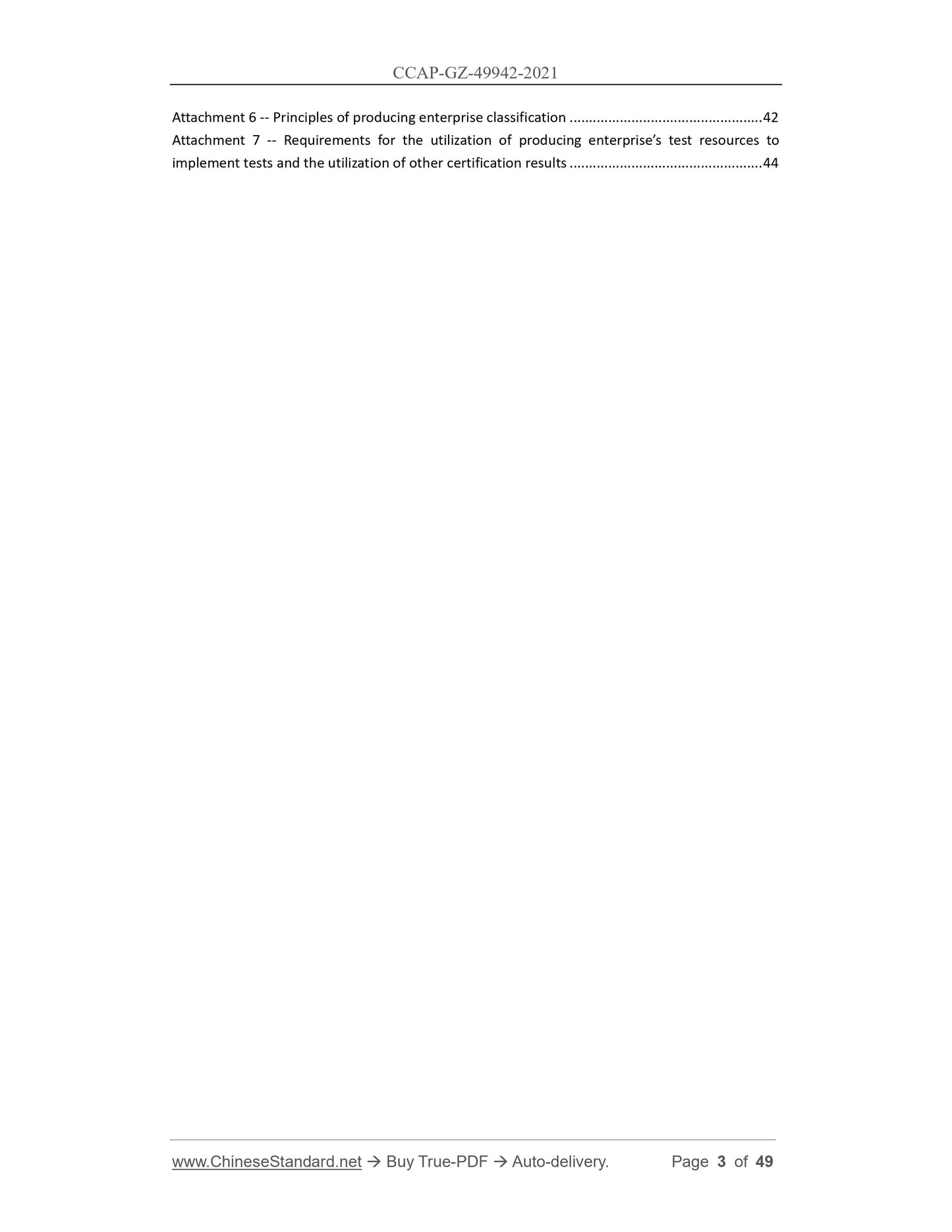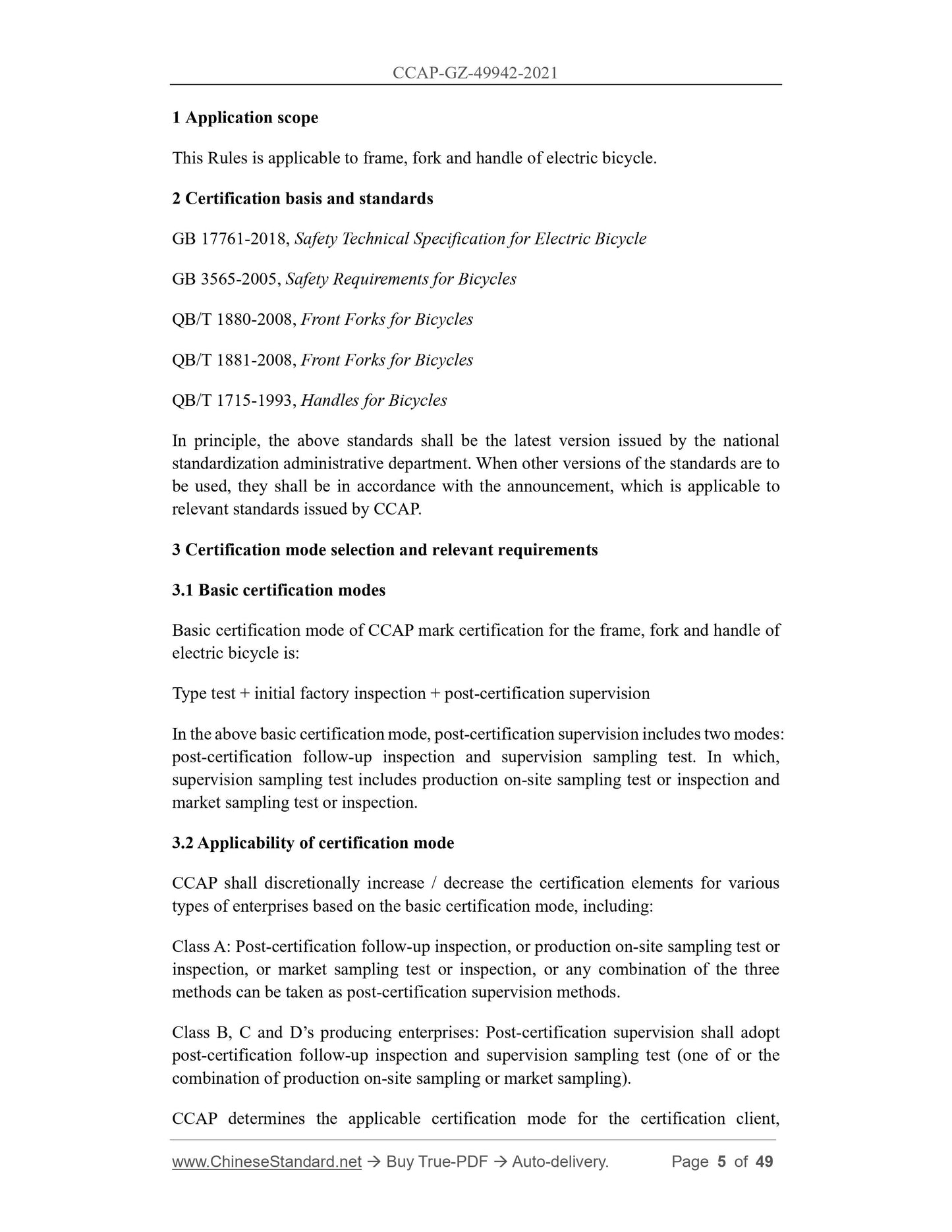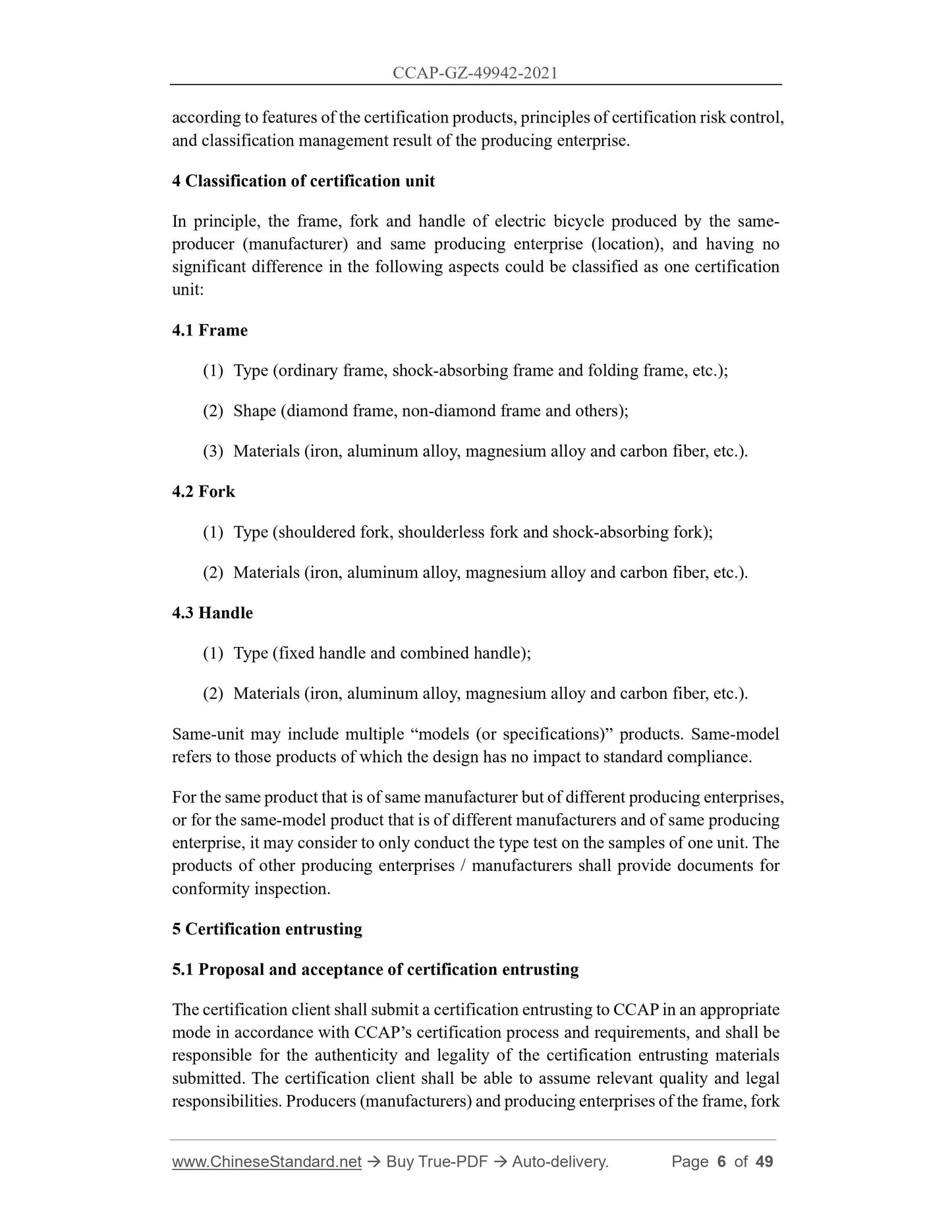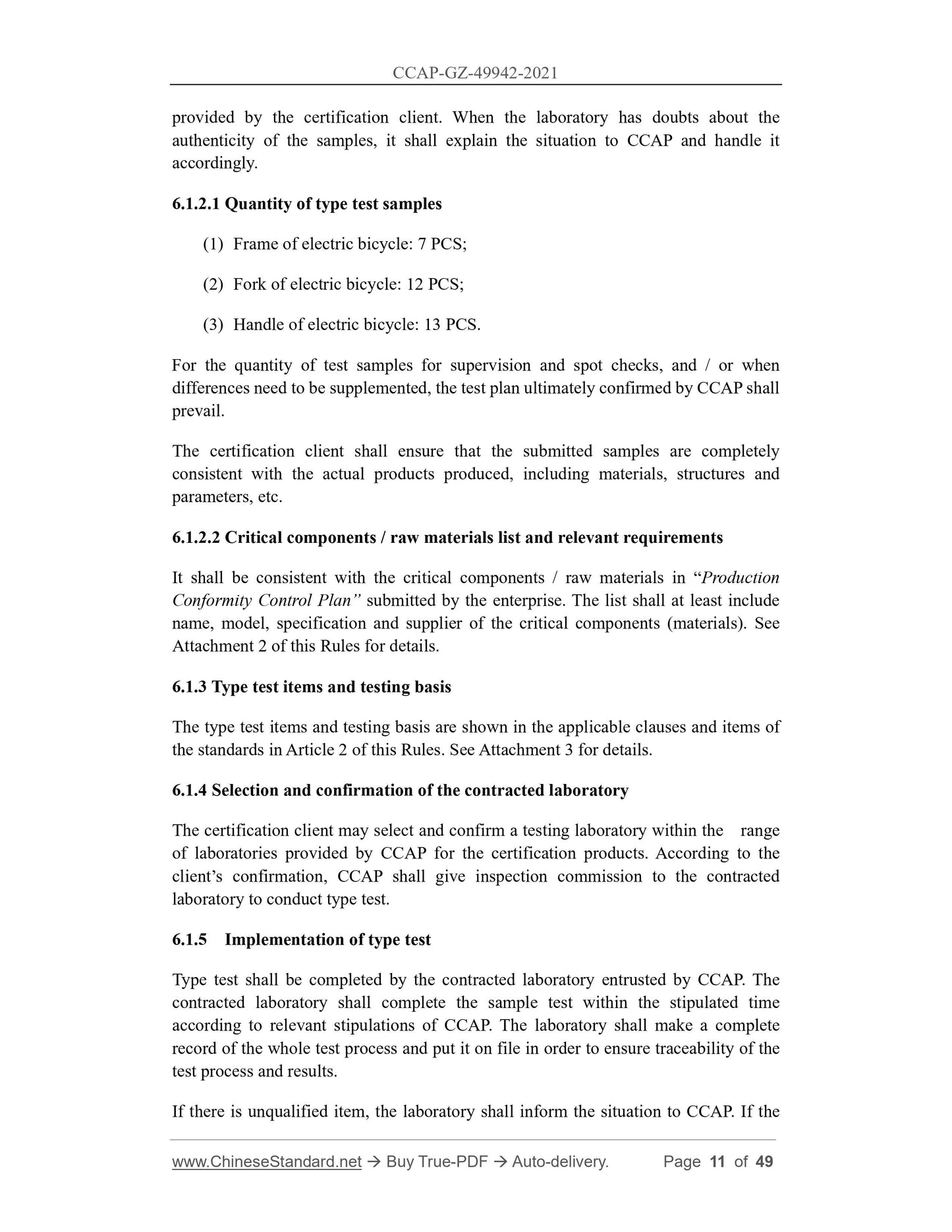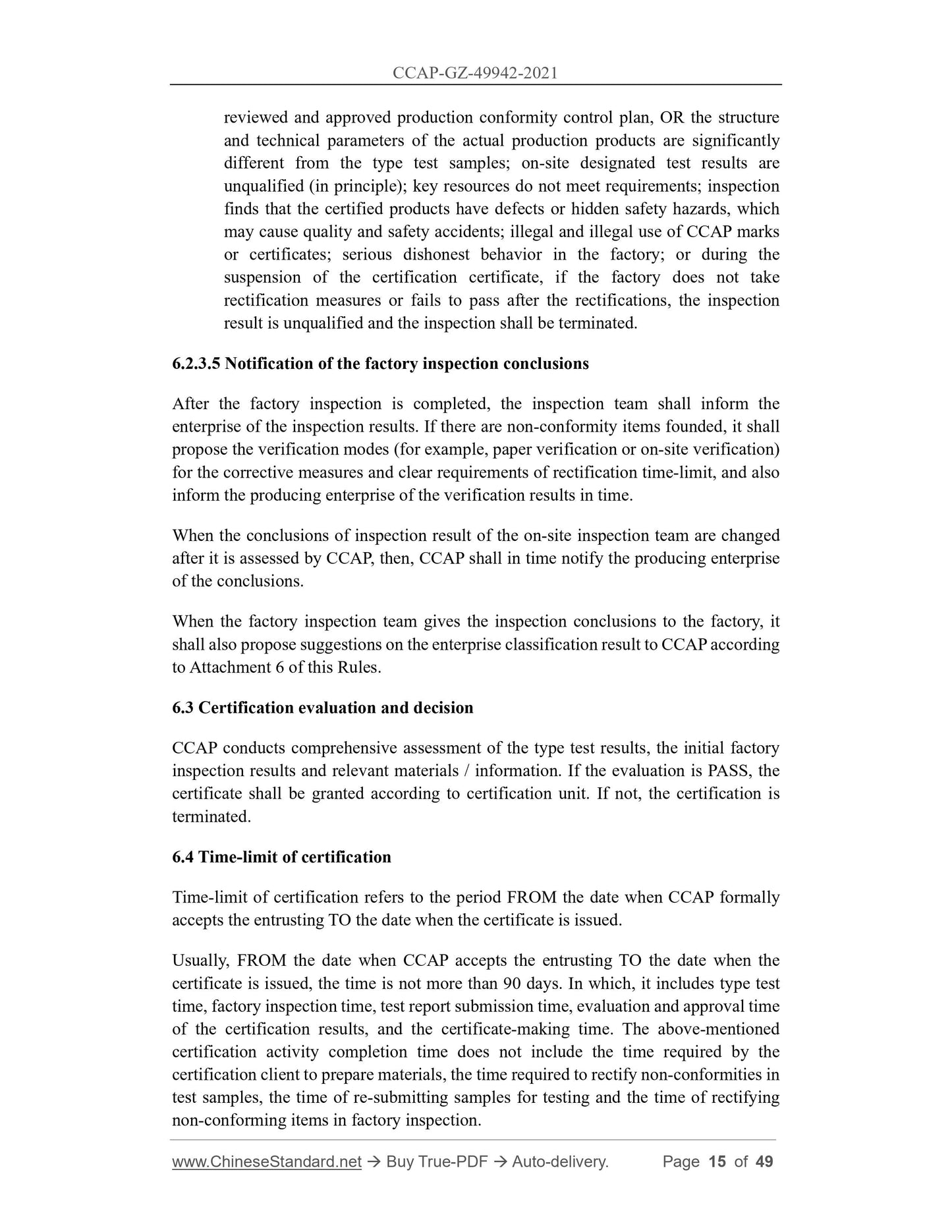1
/
von
12
PayPal, credit cards. Download editable-PDF and invoice in 1 second!
CCAP-GZ-49942-2021 English PDF (CCAP-GZ-49942-2021)
CCAP-GZ-49942-2021 English PDF (CCAP-GZ-49942-2021)
Normaler Preis
$1,380.00 USD
Normaler Preis
Verkaufspreis
$1,380.00 USD
Grundpreis
/
pro
Verfügbarkeit für Abholungen konnte nicht geladen werden
Delivery: 2 working-hours manually (Sales@ChineseStandard.net)
Need delivered in 3-second? USA-Site: CCAP-GZ-49942-2021
Get Quotation: Click CCAP-GZ-49942-2021 (Self-service in 1-minute)
Historical versions (Master-website): CCAP-GZ-49942-2021
Preview True-PDF (Reload/Scroll-down if blank)
CCAP-GZ-49942-2021: Implementation rules for CCAP mark certification -- Frame, fork and handle of electric bicycle
CCAP-GZ-49942-2021
Serial No.: CCAP-GZ-49942:2021
Implementation Rules for CCAP Mark Certification
Frame, Fork and Handle of Electric Bicycle
ISSUED ON: DECEMBER 31, 2021
IMPLEMENTED ON: DECEMBER 31, 2021
China Certification Centre for Automotive Products
Table of Contents
1 Application scope ... 5
2 Certification basis and standards ... 5
3 Certification mode selection and relevant requirements ... 5
3.1 Basic certification modes ... 5
3.2 Applicability of certification mode ... 5
4 Classification of certification unit ... 6
5 Certification entrusting ... 6
5.1 Proposal and acceptance of certification entrusting ... 6
5.2 Certification entrusting materials ... 7
5.3 Implementation arrangements ... 9
6 Certification implementations ... 10
6.1 Type test ... 10
6.2 Initial factory inspection ... 12
6.3 Certification evaluation and decision ... 15
6.4 Time-limit of certification ... 15
7 Post-certification supervision ... 16
7.1 Post-certification follow-up inspection ... 16
7.2 Production on-site sampling test or inspection ... 17
7.3 Market sampling test or inspection ... 18
7.4 Frequency and time of post-certification supervision ... 18
7.5 Record of post-certification supervision ... 19
7.6 Evaluation of post-certification supervision results ... 19
8 Certificate ... 19
8.1 Maintenance of certificate ... 19
8.2 Content of certificate ... 19
8.3 Change of certificate ... 19
8.4 Cancellation, suspension and withdrawal of certificate ... 21
8.5 Use of certificate ... 21
9 Certification marks ... 21
9.1 Mark style permitted to use ... 21
9.2 Use requirements ... 21
10 Charges ... 21
11 Certification responsibilities ... 22
12 Process and time-limit requirements related to technical disputes, complaints and appeal ... 22
Attachment 1 -- Description of Frame, Fork and Handle of Electric Bicycle ... 23
Attachment 2 -- List of Critical Components / Materials of Frame, Fork and Handle of Electric Bicycle
... 25
Attachment 3 -- Type Test Items ... 26
Attachment 4 -- Production conformity requirements ... 28
Appendix 1 -- Factory quality assurance capability requirements ... 30
Attachment 5 -- Compilation requirements of production conformity control plan and
implementation report ... 35
Appendix 1 -- Recommended format of production conformity control plan ... 39
Attachment 6 -- Principles of producing enterprise classification ... 42
Attachment 7 -- Requirements for the utilization of producing enterprise?€?s test resources to
implement tests and the utilization of other certification results ... 44
1 Application scope
This Rules is applicable to frame, fork and handle of electric bicycle.
2 Certification basis and standards
GB 17761-2018, Safety Technical Specification for Electric Bicycle
GB 3565-2005, Safety Requirements for Bicycles
QB/T 1880-2008, Front Forks for Bicycles
QB/T 1881-2008, Front Forks for Bicycles
QB/T 1715-1993, Handles for Bicycles
In principle, the above standards shall be the latest version issued by the national
standardization administrative department. When other versions of the standards are to
be used, they shall be in accordance with the announcement, which is applicable to
relevant standards issued by CCAP.
3 Certification mode selection and relevant requirements
3.1 Basic certification modes
Basic certification mode of CCAP mark certification for the frame, fork and handle of
electric bicycle is:
Type test + initial factory inspection + post-certification supervision
In the above basic certification mode, post-certification supervision includes two modes:
post-certification follow-up inspection and supervision sampling test. In which,
supervision sampling test includes production on-site sampling test or inspection and
market sampling test or inspection.
3.2 Applicability of certification mode
CCAP shall discretionally increase / decrease the certification elements for various
types of enterprises based on the basic certification mode, including:
Class A: Post-certification follow-up inspection, or production on-site sampling test or
inspection, or market sampling test or inspection, or any combination of the three
methods can be taken as post-certification supervision methods.
Class B, C and D?€?s producing enterprises: Post-certification supervision shall adopt
post-certification follow-up inspection and supervision sampling test (one of or the
combination of production on-site sampling or market sampling).
CCAP determines the applicable certification mode for the certification client,
according to features of the certification products, principles of certification risk control,
and classification management result of the producing enterprise.
4 Classification of certification unit
In principle, the frame, fork and handle of electric bicycle produced by the same-
producer (manufacturer) and same producing enterprise (location), and having no
significant difference in the following aspects could be classified as one certification
unit:
4.1 Frame
(1) Type (ordinary frame, shock-absorbing frame and folding frame, etc.);
(2) Shape (diamond frame, non-diamond frame and others);
(3) Materials (iron, aluminum alloy, magnesium alloy and carbon fiber, etc.).
4.2 Fork
(1) Type (shouldered fork, shoulderless fork and shock-absorbing fork);
(2) Materials (iron, aluminum alloy, magnesium alloy and carbon fiber, etc.).
4.3 Handle
(1) Type (fixed handle and combined handle);
(2) Materials (iron, aluminum alloy, magnesium alloy and carbon fiber, etc.).
Same-unit may include multiple ?€?models (or specifications)?€? products. Same-model
refers to those products of which the design has no impact to standard compliance.
For the same product that is of same manufacturer but of different producing enterprises,
or for the same-model product that is of different manufacturers and of same producing
enterprise, it may consider to only conduct the type test on the samples of one unit. The
products of other producing enterprises / manufacturers shall provide documents for
conformity inspection.
5 Certification entrusting
5.1 Proposal and acceptance of certification entrusting
The certification client shall submit a certification entrusting to CCAP in an appropriate
mode in accordance with CCAP?€?s certification process and requirements, and shall be
responsible for the authenticity and legality of the certification entrusting materials
submitted. The certification client shall be able to assume relevant quality and legal
responsibilities. Producers (manufacturers) and producing enterprises of the frame, fork
b. Producer's (manufacturer) trademark registration and legal
authorization to use certification; (The trademark registration
certificate shall be based on the trademark registration certificate,
certificate of registration standard change, certificate of approval and
renewal issued by the Trademark Office of the People's Republic of
China. The category of goods approved for trademark use shall cover
frame, fork and handle products of electric bicycle. The legal
authorized use certificate shall be subject to the trademark registrant's
signing of the trademark use authorization contract or the record
certificate from the Trademark Office.)
c. If the certification client is the seller or the importer, copies of
relevant contract signed between the seller and the producer OR the
importer and the producer shall be provided (when it is the first-time
applicant and when there is change);
d. Power of attorney of the client (when applicable);
4) When entrusting other enterprises for the production of frame, fork and
handle products of electric bicycle, the certification client shall also
provide CCAP with a copy of the relevant contracts between the
entrusting enterprise and the entrusted enterprise, such as: ODM / OEM
agreement signed between the certification client, the producer
(manufacturer) and the producing enterprise, the power of attorney and a
copy of the original ODM certificate (when applicable).
(2) Information of certification product
1) Quality system documents, including:
a. Quality manual (including organization chart and / or responsibility
provisions);
b. Directory of production conformity control files. It shall conform
with the relevant requirements specified in Attachment 4;
c. Copy of the obtained quality management system certificate (if any).
2) Product description of the frame, fork and handle of electric bicycle (see
Attachment 1, for the first application and parameter change);
3) Production conformity control plan (when it is the first application and
when the production conformity control plan changes). Compilation
requirements are shown in Attachment 5;
4) Implementation report of the production conformity control plan. See
Attachment 5 for the compilation requirements (every year after
certification);
5) CCAP mark addition plan (for the first application and change).
The certification client needs to provide a letter of commitment stating that the above-
mentioned materials are authentic and undertake relevant legal responsibilities
(including ?€?three guarantees?€?, ?€?call-back?€? and relevant quality responsibilities).
CCAP is responsible for reviewing, managing, preserving and keeping relevant
materials confidential, and informing the certification client of the results of the review.
5.3 Implementation arrangements
The certification client submits the certification entrusting application to CCAP
(completed on the CCAP certification platform for clients: http://3c.cccap.org.cn).
The normal certification process is as follows:
(1) Review and acceptance of certification entrusting documents;
(2) Division of certification product units and compilation of certification plans;
(3) Signing and charging of certification contracts;
(4) Product type test;
(5) Initial factory inspection;
(6) Comprehensive evaluation and approval of type test and factory inspection
results;
(7) Issuance of certification certificate;
(8) Post-certification supervision.
The abnormal certification process is: if the type test is not carried out in accordance
with the normal certification process and the type test report is directly provided, the
type test results can only be determined to be qualified after the test results of all test
items comply with the requirements of the certification standards and the type test
samples pass the conformity review; if the factory inspection is carried out without
completing the type test of the certification products, the certification client needs to
submit an application to CCAP, and after obtaining the approval, it may simultaneously
perform the inspection.
After accepting the application, CCAP will formulate a certification plan based on the
review results and the production enterprise classification principles (Attachment 6).
The plan includes:
provided by the certification client. When the laboratory has doubts about the
authenticity of the samples, it shall explain the situation to CCAP and handle it
accordingly.
6.1.2.1 Quantity of type test samples
(1) Frame of electric bicycle: 7 PCS;
(2) Fork of electric bicycle: 12 PCS;
(3) Handle of electric bicycle: 13 PCS.
For the quantity of test samples for supervision and spot checks, and / or when
differences need to be supplemented, the test plan ultimately confirmed by CCAP shall
prevail.
The certification client shall ensure that the submitted samples are completely
consistent with the actual products produced, including materials, structures and
parameters, etc.
6.1.2.2 Critical components / raw materials list and relevant requirements
It shall be consistent with the critical components / raw materials in ?€?Production
Conformity Control Plan?€? submitted by the enterprise. The list shall at least include
name, model, specification and supplier of the critical components (materials). See
Attachment 2 of this Rules for details.
6.1.3 Type test items and testing basis
The type test items and testing basis are shown in the applicable clauses and items of
the standards in Article 2 of this Rules. See Attachment 3 for details.
6.1.4 Selection and confirmation of the contracted laboratory
The certification client may select and confirm a testing laboratory within the range
of laboratories provided by CCAP for the certification products. According to the
client?€?s confirmation, CCAP shall give inspection commission to the contracted
laboratory to conduct type test.
6.1.5 Implementation of type test
Type test shall be completed by the contracted laboratory entrusted by CCAP. The
contracted laboratory shall complete the sample test within the stipulated time
according to relevant stipulations of CCAP. The laboratory shall make a complete
record of the whole test process and put it on file in order to ensure traceability of the
test process and results.
If there is unqualified item, the laboratory shall inform the situation to CCAP. If the
certification client continues applying for certification, it is allowed to complete
rectifications within 3 months after analyzing the causes for the non-conformity, and
after the rectifications are completed, it may apply for a re-test. If re-test is required,
the certification client shall submit the rectification material to CCAP. CCAP shall
reconfirm the re-test plan. In principle, samples that are same-specification as the
previous samples shall be selected to conduct all-items test. If it passes the re-test, type
test is PASS. If rectifications are not completed within the required time, and / or
samples are not provided in accordance with the test plan, and / or the re-test is still
NOT-PASS, this certification shall be terminated. The certification client can also apply
for cancelling the certification entrusting; after the rectifications are completed, it can
re-apply for certification entrusting and conduct the type test.
Type test shall not be longer than 15 working days (from the date whe...
Need delivered in 3-second? USA-Site: CCAP-GZ-49942-2021
Get Quotation: Click CCAP-GZ-49942-2021 (Self-service in 1-minute)
Historical versions (Master-website): CCAP-GZ-49942-2021
Preview True-PDF (Reload/Scroll-down if blank)
CCAP-GZ-49942-2021: Implementation rules for CCAP mark certification -- Frame, fork and handle of electric bicycle
CCAP-GZ-49942-2021
Serial No.: CCAP-GZ-49942:2021
Implementation Rules for CCAP Mark Certification
Frame, Fork and Handle of Electric Bicycle
ISSUED ON: DECEMBER 31, 2021
IMPLEMENTED ON: DECEMBER 31, 2021
China Certification Centre for Automotive Products
Table of Contents
1 Application scope ... 5
2 Certification basis and standards ... 5
3 Certification mode selection and relevant requirements ... 5
3.1 Basic certification modes ... 5
3.2 Applicability of certification mode ... 5
4 Classification of certification unit ... 6
5 Certification entrusting ... 6
5.1 Proposal and acceptance of certification entrusting ... 6
5.2 Certification entrusting materials ... 7
5.3 Implementation arrangements ... 9
6 Certification implementations ... 10
6.1 Type test ... 10
6.2 Initial factory inspection ... 12
6.3 Certification evaluation and decision ... 15
6.4 Time-limit of certification ... 15
7 Post-certification supervision ... 16
7.1 Post-certification follow-up inspection ... 16
7.2 Production on-site sampling test or inspection ... 17
7.3 Market sampling test or inspection ... 18
7.4 Frequency and time of post-certification supervision ... 18
7.5 Record of post-certification supervision ... 19
7.6 Evaluation of post-certification supervision results ... 19
8 Certificate ... 19
8.1 Maintenance of certificate ... 19
8.2 Content of certificate ... 19
8.3 Change of certificate ... 19
8.4 Cancellation, suspension and withdrawal of certificate ... 21
8.5 Use of certificate ... 21
9 Certification marks ... 21
9.1 Mark style permitted to use ... 21
9.2 Use requirements ... 21
10 Charges ... 21
11 Certification responsibilities ... 22
12 Process and time-limit requirements related to technical disputes, complaints and appeal ... 22
Attachment 1 -- Description of Frame, Fork and Handle of Electric Bicycle ... 23
Attachment 2 -- List of Critical Components / Materials of Frame, Fork and Handle of Electric Bicycle
... 25
Attachment 3 -- Type Test Items ... 26
Attachment 4 -- Production conformity requirements ... 28
Appendix 1 -- Factory quality assurance capability requirements ... 30
Attachment 5 -- Compilation requirements of production conformity control plan and
implementation report ... 35
Appendix 1 -- Recommended format of production conformity control plan ... 39
Attachment 6 -- Principles of producing enterprise classification ... 42
Attachment 7 -- Requirements for the utilization of producing enterprise?€?s test resources to
implement tests and the utilization of other certification results ... 44
1 Application scope
This Rules is applicable to frame, fork and handle of electric bicycle.
2 Certification basis and standards
GB 17761-2018, Safety Technical Specification for Electric Bicycle
GB 3565-2005, Safety Requirements for Bicycles
QB/T 1880-2008, Front Forks for Bicycles
QB/T 1881-2008, Front Forks for Bicycles
QB/T 1715-1993, Handles for Bicycles
In principle, the above standards shall be the latest version issued by the national
standardization administrative department. When other versions of the standards are to
be used, they shall be in accordance with the announcement, which is applicable to
relevant standards issued by CCAP.
3 Certification mode selection and relevant requirements
3.1 Basic certification modes
Basic certification mode of CCAP mark certification for the frame, fork and handle of
electric bicycle is:
Type test + initial factory inspection + post-certification supervision
In the above basic certification mode, post-certification supervision includes two modes:
post-certification follow-up inspection and supervision sampling test. In which,
supervision sampling test includes production on-site sampling test or inspection and
market sampling test or inspection.
3.2 Applicability of certification mode
CCAP shall discretionally increase / decrease the certification elements for various
types of enterprises based on the basic certification mode, including:
Class A: Post-certification follow-up inspection, or production on-site sampling test or
inspection, or market sampling test or inspection, or any combination of the three
methods can be taken as post-certification supervision methods.
Class B, C and D?€?s producing enterprises: Post-certification supervision shall adopt
post-certification follow-up inspection and supervision sampling test (one of or the
combination of production on-site sampling or market sampling).
CCAP determines the applicable certification mode for the certification client,
according to features of the certification products, principles of certification risk control,
and classification management result of the producing enterprise.
4 Classification of certification unit
In principle, the frame, fork and handle of electric bicycle produced by the same-
producer (manufacturer) and same producing enterprise (location), and having no
significant difference in the following aspects could be classified as one certification
unit:
4.1 Frame
(1) Type (ordinary frame, shock-absorbing frame and folding frame, etc.);
(2) Shape (diamond frame, non-diamond frame and others);
(3) Materials (iron, aluminum alloy, magnesium alloy and carbon fiber, etc.).
4.2 Fork
(1) Type (shouldered fork, shoulderless fork and shock-absorbing fork);
(2) Materials (iron, aluminum alloy, magnesium alloy and carbon fiber, etc.).
4.3 Handle
(1) Type (fixed handle and combined handle);
(2) Materials (iron, aluminum alloy, magnesium alloy and carbon fiber, etc.).
Same-unit may include multiple ?€?models (or specifications)?€? products. Same-model
refers to those products of which the design has no impact to standard compliance.
For the same product that is of same manufacturer but of different producing enterprises,
or for the same-model product that is of different manufacturers and of same producing
enterprise, it may consider to only conduct the type test on the samples of one unit. The
products of other producing enterprises / manufacturers shall provide documents for
conformity inspection.
5 Certification entrusting
5.1 Proposal and acceptance of certification entrusting
The certification client shall submit a certification entrusting to CCAP in an appropriate
mode in accordance with CCAP?€?s certification process and requirements, and shall be
responsible for the authenticity and legality of the certification entrusting materials
submitted. The certification client shall be able to assume relevant quality and legal
responsibilities. Producers (manufacturers) and producing enterprises of the frame, fork
b. Producer's (manufacturer) trademark registration and legal
authorization to use certification; (The trademark registration
certificate shall be based on the trademark registration certificate,
certificate of registration standard change, certificate of approval and
renewal issued by the Trademark Office of the People's Republic of
China. The category of goods approved for trademark use shall cover
frame, fork and handle products of electric bicycle. The legal
authorized use certificate shall be subject to the trademark registrant's
signing of the trademark use authorization contract or the record
certificate from the Trademark Office.)
c. If the certification client is the seller or the importer, copies of
relevant contract signed between the seller and the producer OR the
importer and the producer shall be provided (when it is the first-time
applicant and when there is change);
d. Power of attorney of the client (when applicable);
4) When entrusting other enterprises for the production of frame, fork and
handle products of electric bicycle, the certification client shall also
provide CCAP with a copy of the relevant contracts between the
entrusting enterprise and the entrusted enterprise, such as: ODM / OEM
agreement signed between the certification client, the producer
(manufacturer) and the producing enterprise, the power of attorney and a
copy of the original ODM certificate (when applicable).
(2) Information of certification product
1) Quality system documents, including:
a. Quality manual (including organization chart and / or responsibility
provisions);
b. Directory of production conformity control files. It shall conform
with the relevant requirements specified in Attachment 4;
c. Copy of the obtained quality management system certificate (if any).
2) Product description of the frame, fork and handle of electric bicycle (see
Attachment 1, for the first application and parameter change);
3) Production conformity control plan (when it is the first application and
when the production conformity control plan changes). Compilation
requirements are shown in Attachment 5;
4) Implementation report of the production conformity control plan. See
Attachment 5 for the compilation requirements (every year after
certification);
5) CCAP mark addition plan (for the first application and change).
The certification client needs to provide a letter of commitment stating that the above-
mentioned materials are authentic and undertake relevant legal responsibilities
(including ?€?three guarantees?€?, ?€?call-back?€? and relevant quality responsibilities).
CCAP is responsible for reviewing, managing, preserving and keeping relevant
materials confidential, and informing the certification client of the results of the review.
5.3 Implementation arrangements
The certification client submits the certification entrusting application to CCAP
(completed on the CCAP certification platform for clients: http://3c.cccap.org.cn).
The normal certification process is as follows:
(1) Review and acceptance of certification entrusting documents;
(2) Division of certification product units and compilation of certification plans;
(3) Signing and charging of certification contracts;
(4) Product type test;
(5) Initial factory inspection;
(6) Comprehensive evaluation and approval of type test and factory inspection
results;
(7) Issuance of certification certificate;
(8) Post-certification supervision.
The abnormal certification process is: if the type test is not carried out in accordance
with the normal certification process and the type test report is directly provided, the
type test results can only be determined to be qualified after the test results of all test
items comply with the requirements of the certification standards and the type test
samples pass the conformity review; if the factory inspection is carried out without
completing the type test of the certification products, the certification client needs to
submit an application to CCAP, and after obtaining the approval, it may simultaneously
perform the inspection.
After accepting the application, CCAP will formulate a certification plan based on the
review results and the production enterprise classification principles (Attachment 6).
The plan includes:
provided by the certification client. When the laboratory has doubts about the
authenticity of the samples, it shall explain the situation to CCAP and handle it
accordingly.
6.1.2.1 Quantity of type test samples
(1) Frame of electric bicycle: 7 PCS;
(2) Fork of electric bicycle: 12 PCS;
(3) Handle of electric bicycle: 13 PCS.
For the quantity of test samples for supervision and spot checks, and / or when
differences need to be supplemented, the test plan ultimately confirmed by CCAP shall
prevail.
The certification client shall ensure that the submitted samples are completely
consistent with the actual products produced, including materials, structures and
parameters, etc.
6.1.2.2 Critical components / raw materials list and relevant requirements
It shall be consistent with the critical components / raw materials in ?€?Production
Conformity Control Plan?€? submitted by the enterprise. The list shall at least include
name, model, specification and supplier of the critical components (materials). See
Attachment 2 of this Rules for details.
6.1.3 Type test items and testing basis
The type test items and testing basis are shown in the applicable clauses and items of
the standards in Article 2 of this Rules. See Attachment 3 for details.
6.1.4 Selection and confirmation of the contracted laboratory
The certification client may select and confirm a testing laboratory within the range
of laboratories provided by CCAP for the certification products. According to the
client?€?s confirmation, CCAP shall give inspection commission to the contracted
laboratory to conduct type test.
6.1.5 Implementation of type test
Type test shall be completed by the contracted laboratory entrusted by CCAP. The
contracted laboratory shall complete the sample test within the stipulated time
according to relevant stipulations of CCAP. The laboratory shall make a complete
record of the whole test process and put it on file in order to ensure traceability of the
test process and results.
If there is unqualified item, the laboratory shall inform the situation to CCAP. If the
certification client continues applying for certification, it is allowed to complete
rectifications within 3 months after analyzing the causes for the non-conformity, and
after the rectifications are completed, it may apply for a re-test. If re-test is required,
the certification client shall submit the rectification material to CCAP. CCAP shall
reconfirm the re-test plan. In principle, samples that are same-specification as the
previous samples shall be selected to conduct all-items test. If it passes the re-test, type
test is PASS. If rectifications are not completed within the required time, and / or
samples are not provided in accordance with the test plan, and / or the re-test is still
NOT-PASS, this certification shall be terminated. The certification client can also apply
for cancelling the certification entrusting; after the rectifications are completed, it can
re-apply for certification entrusting and conduct the type test.
Type test shall not be longer than 15 working days (from the date whe...
Share


